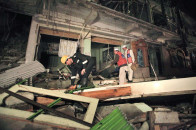Interfaith discourse: Reconcile faith with modernity, says bishop
Religion and cohesion in a social, global setting discussed.

Religion and cohesion in a social, global setting discussed. PHOTO: FILE
“Religion, in a social setting, can and does go wrong...but that is because there are a lot of things about people that can and do go wrong,” Bishop Michael Nazir-Ali said in his lecture at Forman Christian College on Tuesday.
The lecture on Christian and Muslim Views on the Social Dimension of Religion was delivered to a large audience at the S-9 auditorium at FC College.

Formerly the Lord Bishop of Rochester in the Church of England, Bishop Nazir-Ali is now director at the Oxford Centre for Training, Research, Advocacy and Dialogue. This was his second visit to FC College.
Nazir-Ali shared anecdotes from his time in Bosnia during the civil war, when he volunteered to carry out relief work under the Christian Aid.
He said they had tried to cooperate with ongoing relief efforts in the area but were only partially successful due to strong divisions within the community. “Strong divisions within the Bosnian society showed me how religion could go wrong when and if mixed with chauvinism and nationalism,” he said.
Religious extremism, he observed, significantly changed not only the direction of a nation but also adversely impacted its integration.

“We need to admit that religion should be held accountable.”
Speaking on the subject of accountability, the bishop said that in a world where global opinion can no longer be ignored, it is essential that religion too be held accountable in reference to how the world views it.
“We need to appreciate the growing importance of global opinion and how it is being shaped.”
Nazir-Ali said that both religion and religious people were accountable to each other... “this is why interfaith dialogues are held”. He said mutual accountability on equal footing was important in matters involving different faiths.
“Every society must have and live by beliefs and values that allow for cohesion. What these values are and how they can be owned by the society are what need to be determined.” He spoke of conflict between religion and state.
These conflicts, he said, may arise from when the state prohibits that which is part of religion, thereby meddling in religious freedom, or when the state demands something prohibited in religion.
He spoke about democracy and said there was a need to ensure that it does not turn into a “democratic tyranny”.
“You simply can’t take ethical decisions by counting heads.” The voices which investigated Islam in the context of modernity are fading out.
Nazir-Ali said, “From Shah Waliullah of Delhi, who invested much in determining modern aspects of Islam during the decline of the Mughal Empire, to Sir Syed Ahmed Khan and Allama Iqbal, all had delved into relating Islam to the modern world.”
Published in The Express Tribune, March 26th, 2014.



















COMMENTS
Comments are moderated and generally will be posted if they are on-topic and not abusive.
For more information, please see our Comments FAQ